SEO
The Only Guide You Need
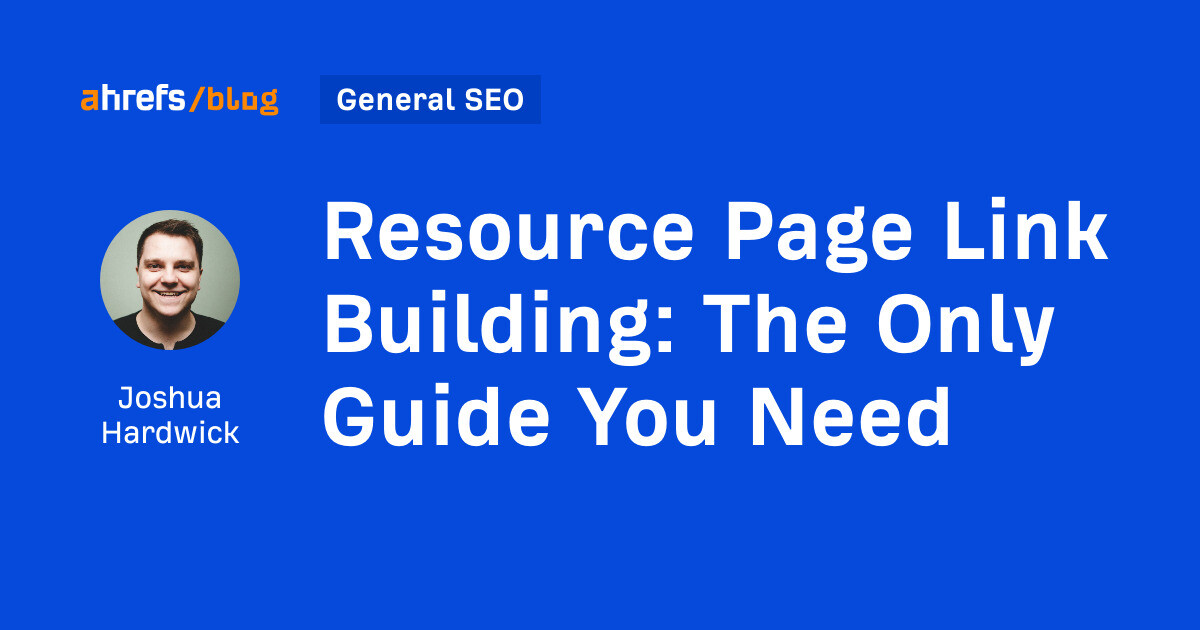
Resource page link building is nothing new, but it remains a popular link building tactic.
How popular? According to Aira’s 2022 State of Link Building Report, 24% of SEOs use it:

Here are three reasons why:
- It works.
- It’s scalable.
- It’s relatively easy.
In this guide, I’ll explain how to build links from resource pages in three simple steps.
But first, let’s make sure we’re on the same page.
Resource page link building is where you get backlinks from webpages that curate and link out to useful industry resources.
Here’s what a typical resource page looks like:
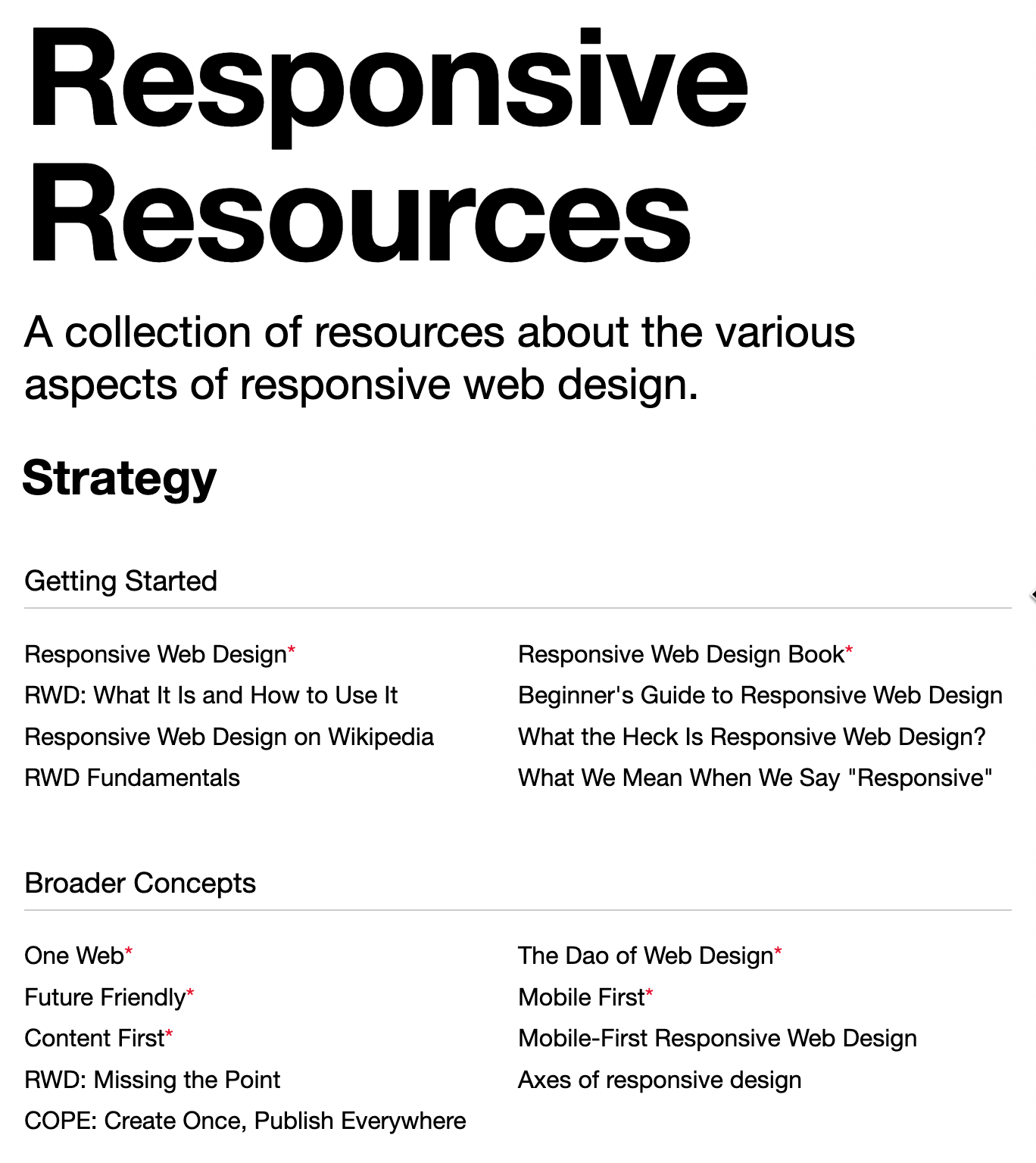
If you have a great design resource, you can reach out to the creator of that page and suggest it for inclusion.
Suggesting a useful resource to a resource page owner helps keep the page fresh and up to date. That’s why many of their creators actually ask for submissions.

This means you don’t have to do too much convincing to get useful resources added.
You’ll first need a useful resource to pitch. This can be your homepage. But in most cases, it’ll be an informational resource or interactive tool. If you don’t have that, read our guide to creating link bait.
If you’re good to go, follow this process:
- Find relevant resource pages
- Vet the pages
- Reach out and suggest your resource
1. Find relevant resource pages
The easiest way to do this is with Google search operators.
To set yourself up for success, start by doing these three things:
- Create a free Ahrefs Webmaster Tools account
- Install Ahrefs’ SEO Toolbar
- Go here and set the number of Google search results per page to 100
Next, head back to Google and type a broad keyword related to your resource followed by this search operator: intitle:resources inurl:resources.html.
For example, if your resource is a keto diet calculator, you may search for this:

Next, click the SEO Toolbar icon in your browser and toggle “SERP tools” on, as well as “Results metrics” under the SERP settings.
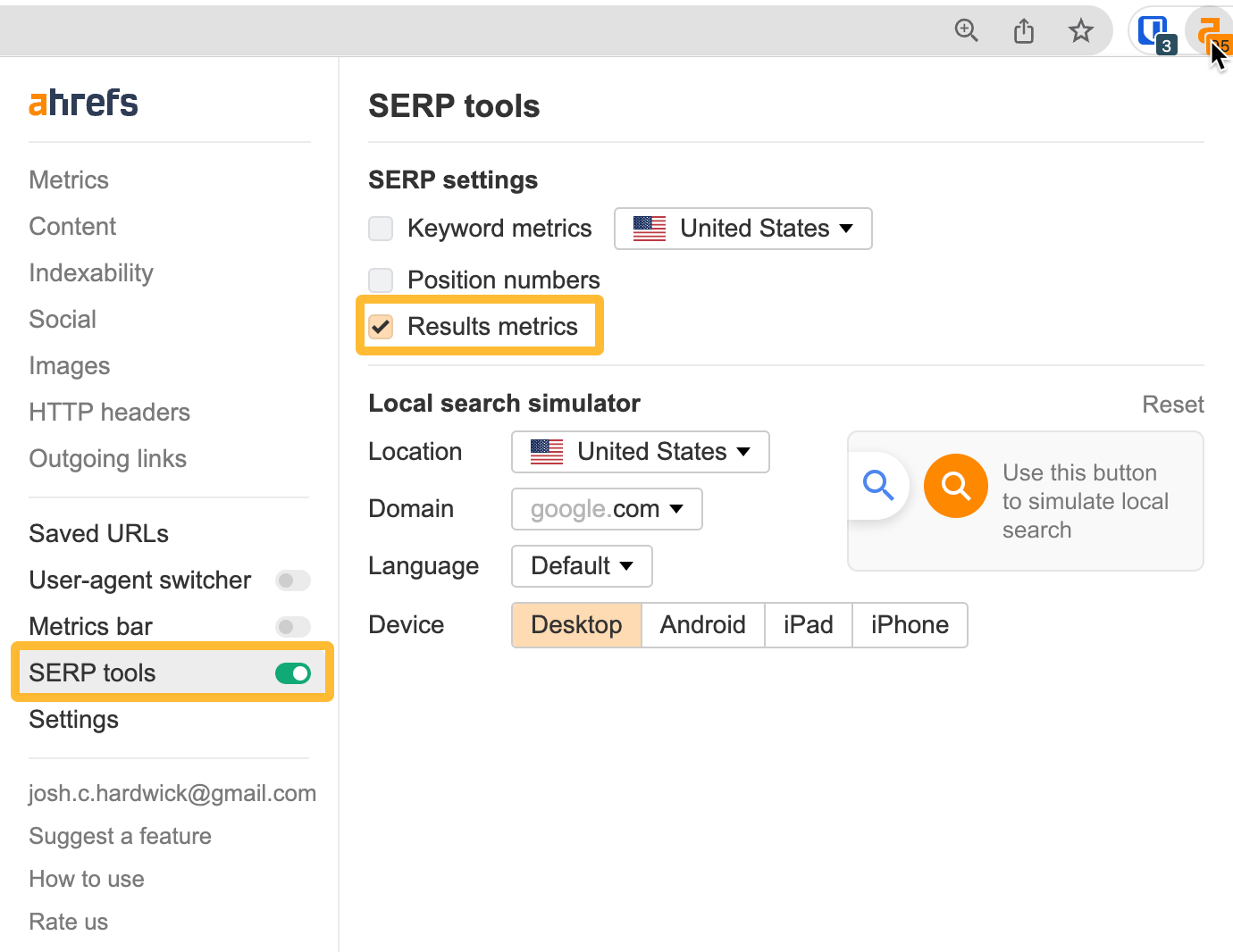
You should now see an Ahrefs overlay in the Google search results with an “Export CSV” button. Click this to export the results.
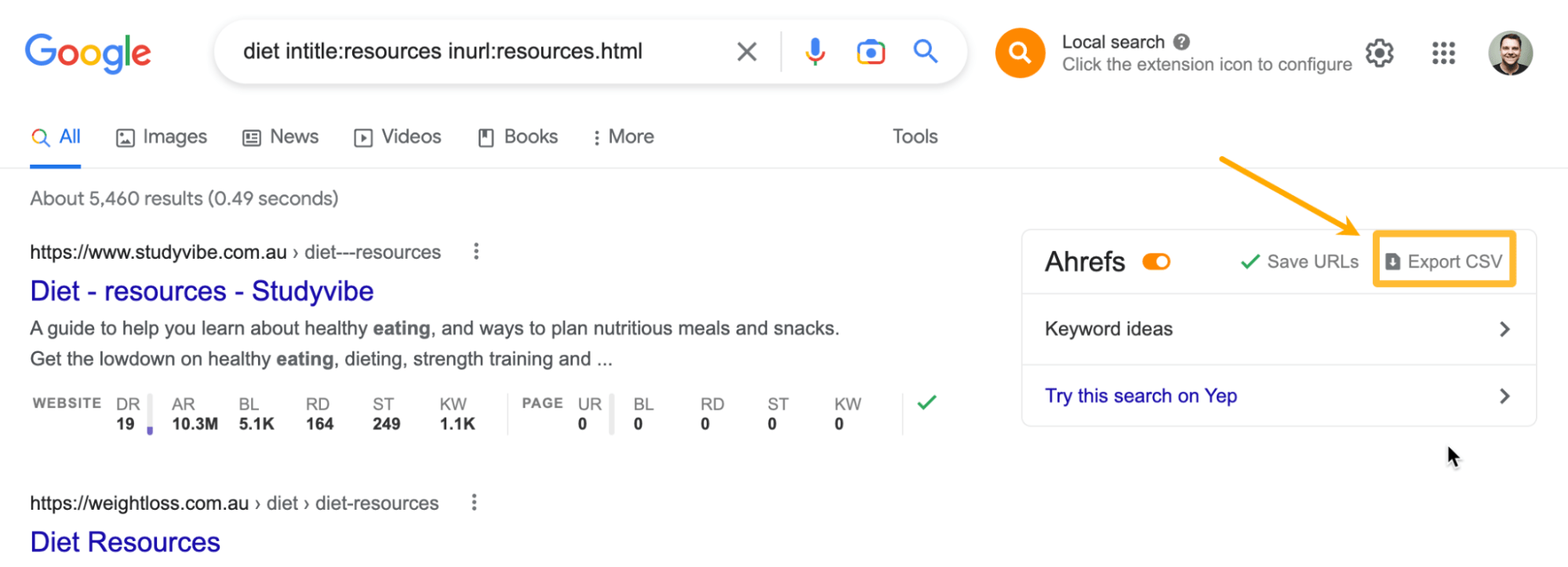
You can then repeat the process for other similar search operators to find more pages, such as:
- fitness intitle:resources inurl:links.html
- fitness intitle:links inurl: resources.html
- fitness inurl:.com/resources
- fitness inurl:resources intitle:resources
Sidenote.
Make sure to change the keyword to something relevant to your resource. It’s also best to keep it quite broad, as you’ll struggle to find relevant results if you go too niche.
If you want even more search operators, use this Google sheet. All you have to do is add up to 10 keywords in the highlighted cells, then head over to the “Results” tab where you’ll have hundreds of search operators ready to go.
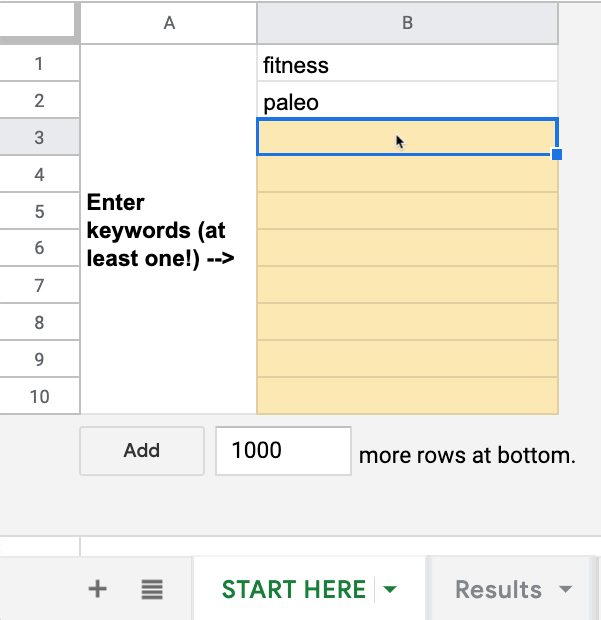
Finally, you can merge all the exported CSVs using this website.
Time-saving tip
If this process sounds like too much hard work, fill in the Google sheet with your keywords and send them to your virtual assistant along with these instructions:
- Install Ahrefs’ SEO Toolbar
- Open this Google sheet: [insert link]
- Click the first link “SERP link” in the tab labeled “Results”
- Click the “Export CSV” button on the Ahrefs overlay in the search results
- Repeat this for the other operators in the sheet
- Use this website to merge the CSVs into one
- Send the final “master” CSV file to me, and bill for your time 🙂
Or, if you prefer an automated solution, use a tool like ScrapeBox or Citation Labs Link Prospector. Just keep in mind that neither of these are free. You’ll need proxies for ScrapeBox, and scrapes in Citation Labs cost $1–$5 a pop.
2. Vet the pages
Not all of the results you scraped from Google will be relevant, so you need to vet them before reaching out. This is a two-step process:
- Filter and eliminate using metrics
- Manually review the remaining pages
A. Filter and eliminate using metrics
You’ve probably got far too many pages on your list to realistically vet by hand, but luckily you can weed out most of the junk with SEO metrics.
Follow this flowchart to find the easiest way to get these metrics for you:
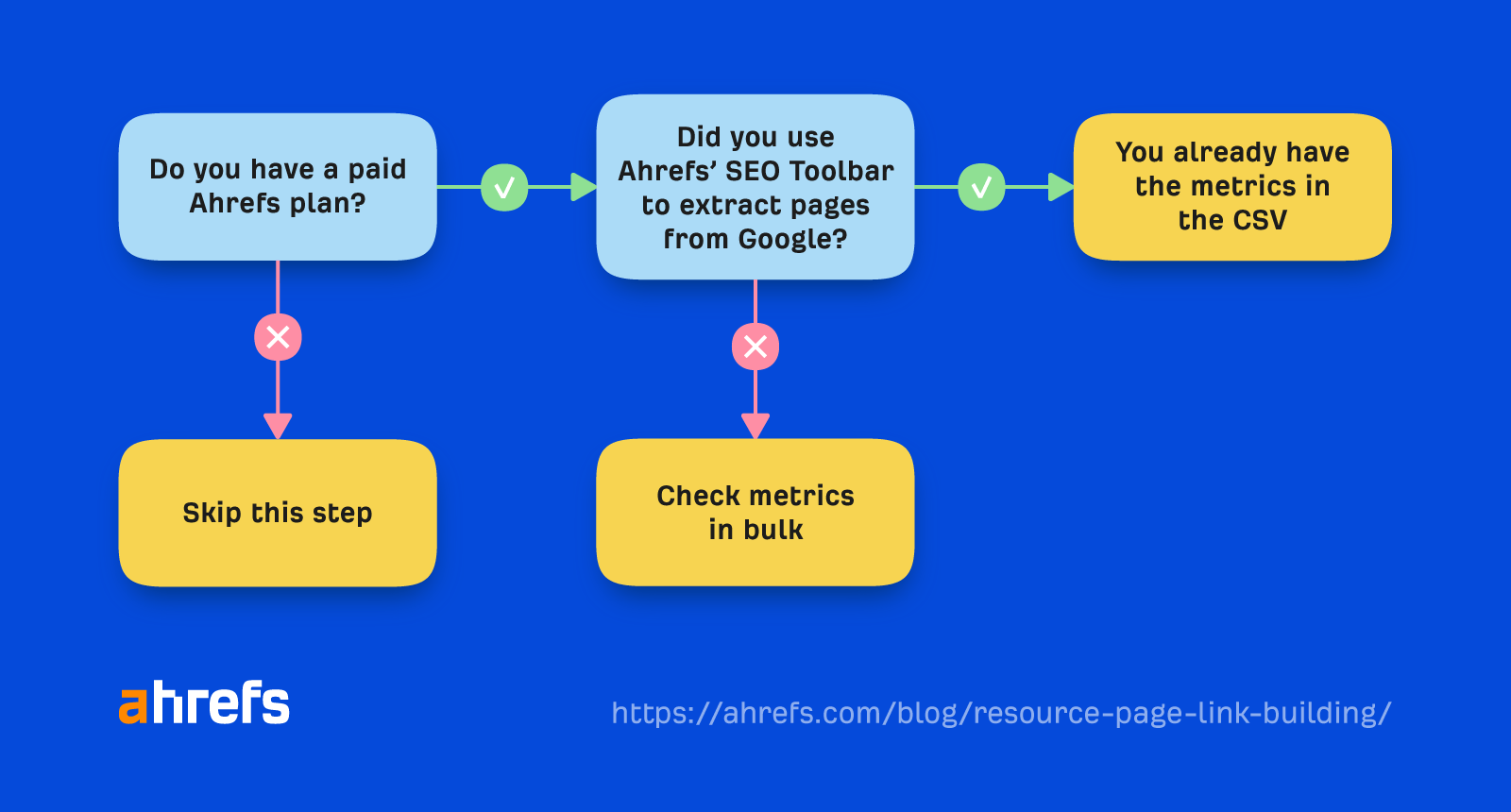
As the flowchart explains, if you have a paid Ahrefs plan and used our SEO Toolbar to extract Google’s results, the metrics are already in your CSV.

If not, there are two options:
Once you’ve pulled the metrics, you can just filter the spreadsheet for prospects that match your requirements. If you’re not sure where to start, here’s my suggestion:
- Domain Rating (DR) >= 10
- Domain Search Traffic (ST): >= 5000
This should be enough to cut the list down by around 70%.
Sidenote.
You can also filter the URL column to remove pages from certain websites, like Twitter or Facebook.
B. Manually review the remaining pages
The easiest way to do this is to open the remaining URLs in batches of five to 10 and review the pages manually. You can use openallurls.com to make this easier.
This process is a bit subjective, but you’re basically looking for pages that:
- Link out to external resources.
- Link to other topically related resources.
- Look like someone cares about maintaining them.
But most importantly, you should look to identify the pages where the addition of your link will add value. Make an effort to do that, and your conversion rate will skyrocket.
For any prospects that don’t meet your requirements, put an “x” in the URL/target column to signify that you don’t need to pitch them.
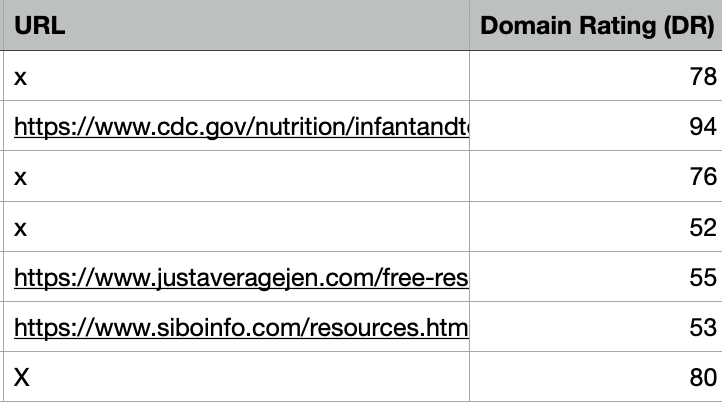
3. Reach out and suggest your resource
Lastly, you need to find the person responsible for maintaining each resource page and let them know your content exists.
That goes something like this:
- Hey, [Name].
- Just came across your list of resources here: https://ahrefs.com/blog/resource-page-link-building/.
- We just created [x].
- It might make a worthwhile addition to the page.
Sidenote.
I’ve purposely paraphrased this template to encourage you to add your own creative flair.
Here are a few tips to get the most from your efforts:
Tip 1. Respect their preferred contact method
Mail merges are your friend when it comes to doing email outreach at scale. But you shouldn’t ignore the person’s preferred contact method just to make your life easier.
If someone says you should submit resources using a contact form, respect their wishes.
Tip 2. Email the person responsible for the page
Emailing [email protected] is usually avoidable. It’s what lazy marketers do when they can’t be bothered to hunt down a real person’s email address.
Don’t be that marketer. Make an effort to figure out who’s responsible for the page and contact them directly. Your conversion rate will thank you for it.
Tip 3. Tell them where the link should go
Links on resource pages are often divided into subgroups. Don’t hesitate to tell the recipient where you think your resource should be placed. It’s helpful.
Tip 4. Point out broken links on the page
Broken links on a resource page are yet another incentive for the site owner to edit them. And if they’re doing that, they may as well add your resource while they’re there.
Here’s an easy (and free) way to check for dead links on a page:
- Go to “Outgoing links” on Ahrefs’ SEO Toolbar
- Click “Check status”
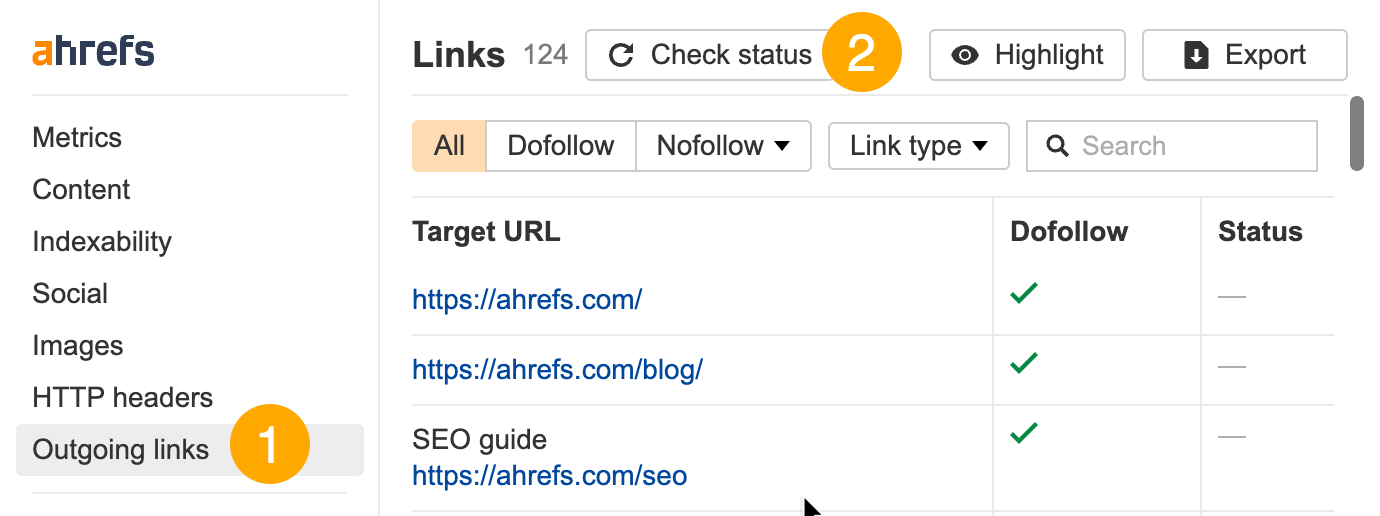
You can then filter for broken links and export them.
It’s then just a case of letting the site owner know about the dead links in your email.
Tip
If you’re using Screaming Frog and want to make this process more efficient, just hit Bulk Export > Response codes > External Links > External Client Error (4xx) Inlinks.
You can then work some spreadsheet magic (VLOOKUP, QUERY) to pull this data into your master prospecting file. That makes it easy to templatize outreach emails using custom mail-merge fields in popular outreach tools like BuzzStream, Pitchbox, and Mailshake.
Tip 5. Don’t pay
Buying links is against Google’s guidelines. Plus, if someone is selling links on a resource page, chances are the page will be pretty useless and spammy.
Follow all of the instructions above, and it should be enough to land at least a handful of resource page links in most niches. But why stop there? There are plenty of other ways to find even more resource pages.
Here are three of them:
1. Search the backlink profiles of sites with known resource page links
Given that resource page link building is a common link building tactic, if a page has a link from one resource page, it probably has links from other resource pages.
Here’s how to find those resource pages:
- Crawl your vetted list of resource pages with Screaming Frog
- Go to Bulk Export > Links > External Links
- Open the CSV and copy all URLs in the “Destination” column
- Paste them into this Google sheet
- Go to the “Results” tab
You should now see a list of websites that have at least one resource page backlink:
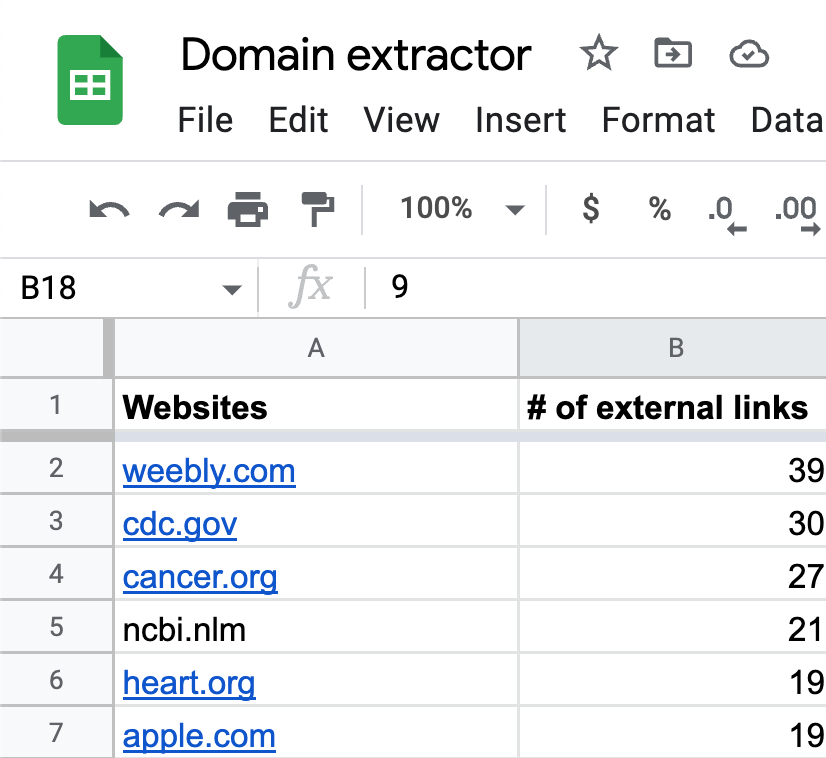
From here, you can simply paste any relevant domains into Ahrefs’ Site Explorer, go to the Backlinks report, and search for “resources.htm” in the referring page URL.
For example, if we do this for eatright.org, we get 344 results:
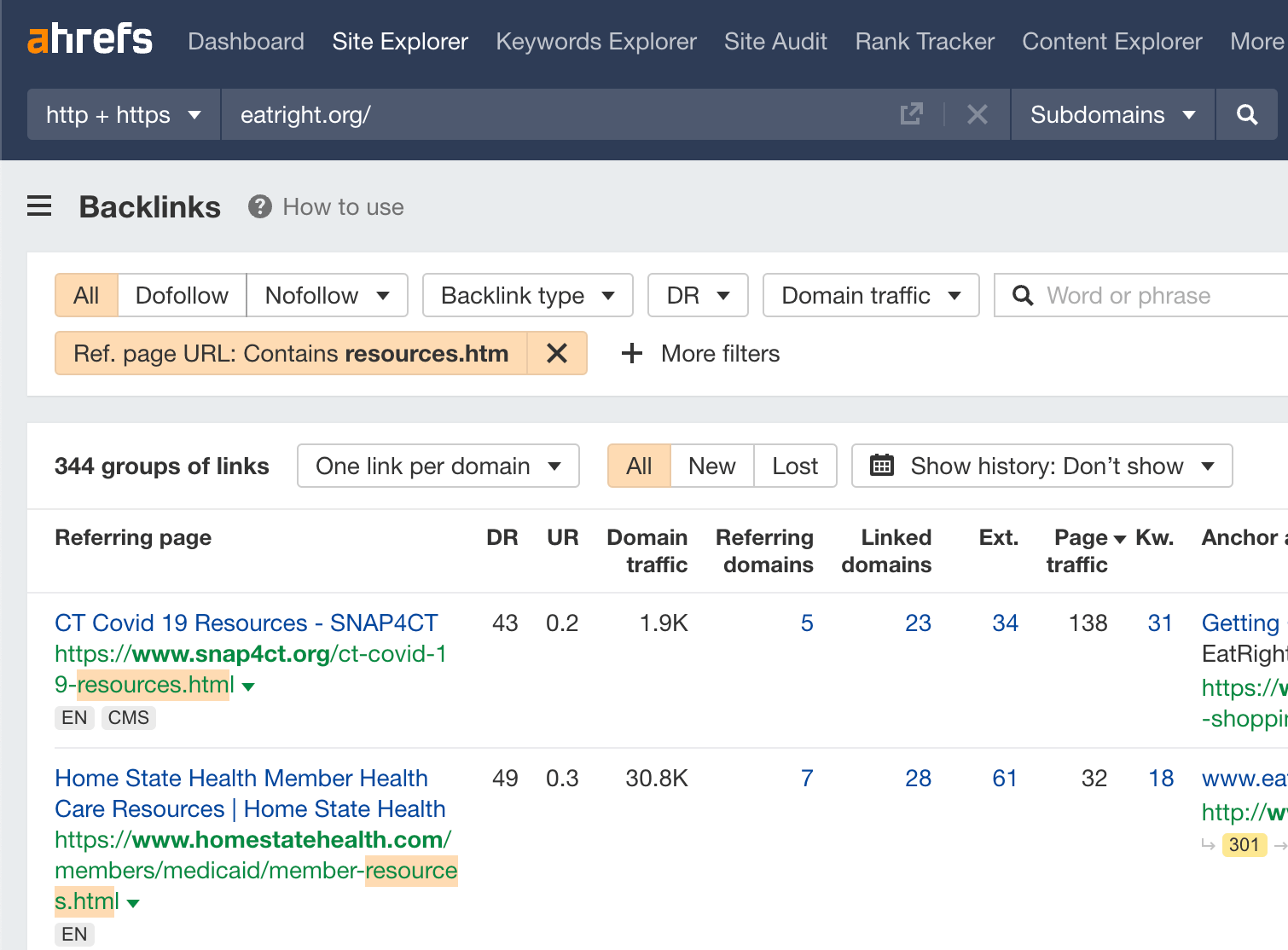
Here’s just one example:
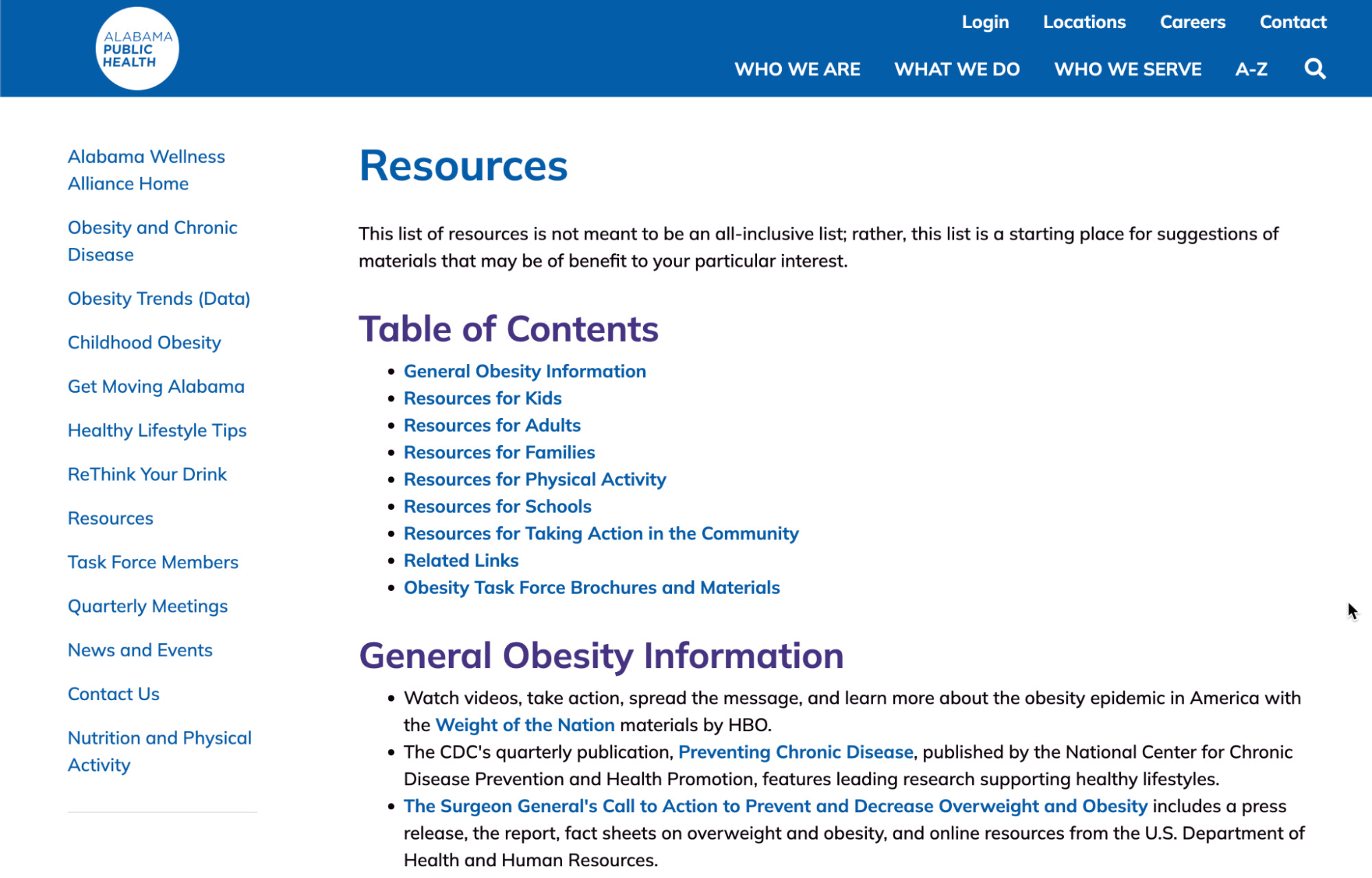
2. Search for listicle resource pages
Most “traditional” resource page search operators won’t find listicles like this:
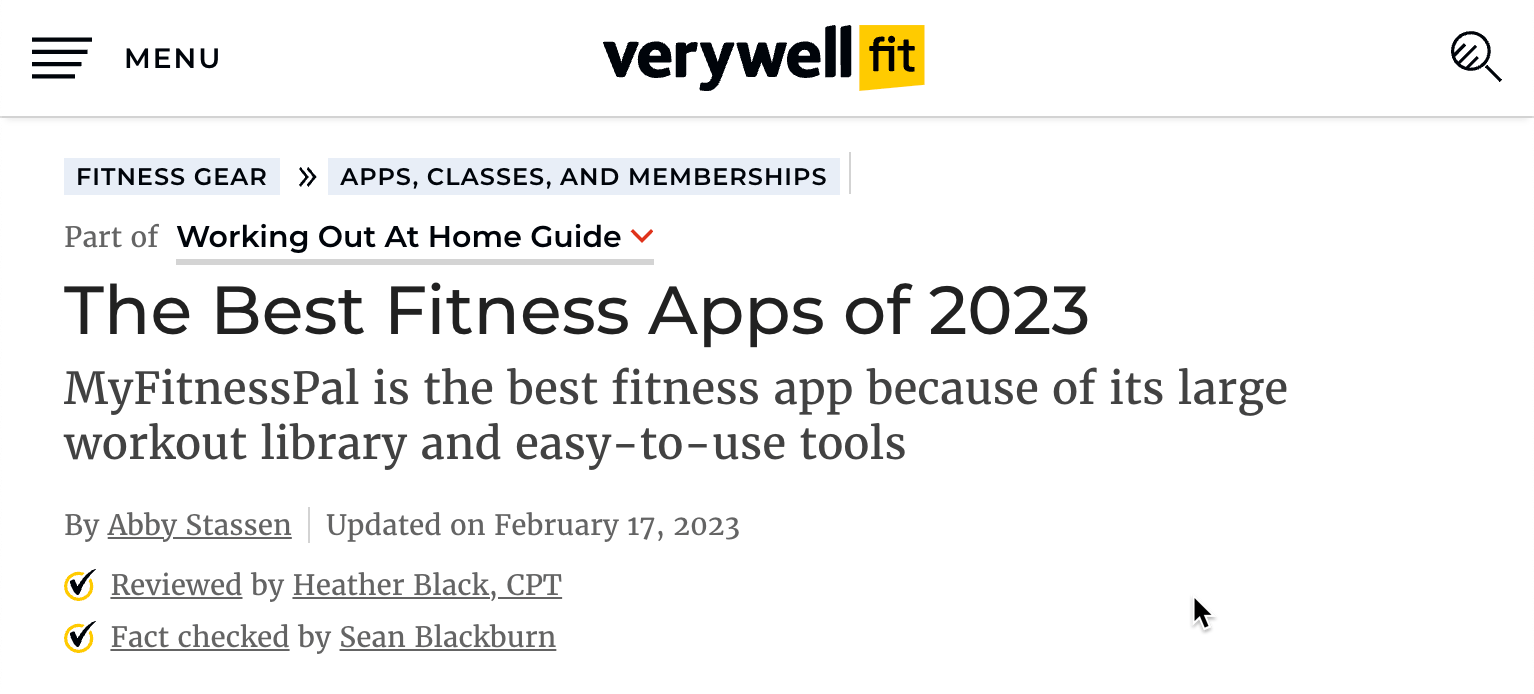
That’s a shame because these are also “resource” pages in their own right, as they list and link useful resources.
To find these pages, just search Google for “best [thing]”.
For example, if you run a gym in London, you could simply search for “best gyms in london”:
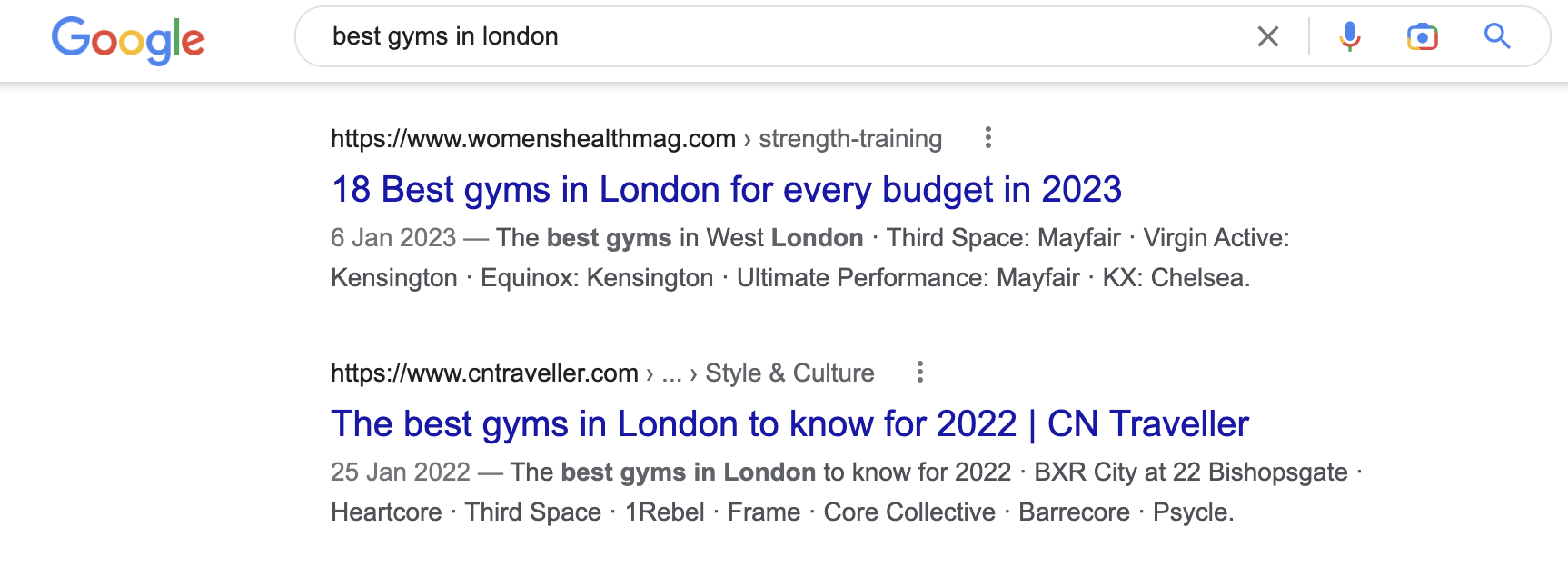
You can then use Ahrefs’ SEO Toolbar to extract these to a CSV file (along with SEO metrics, for paying customers).
If you’re an Ahrefs user, you can speed up your search using Content Explorer. Just run an “In title” search and filter for pages that match your criteria (e.g., DR 30+).
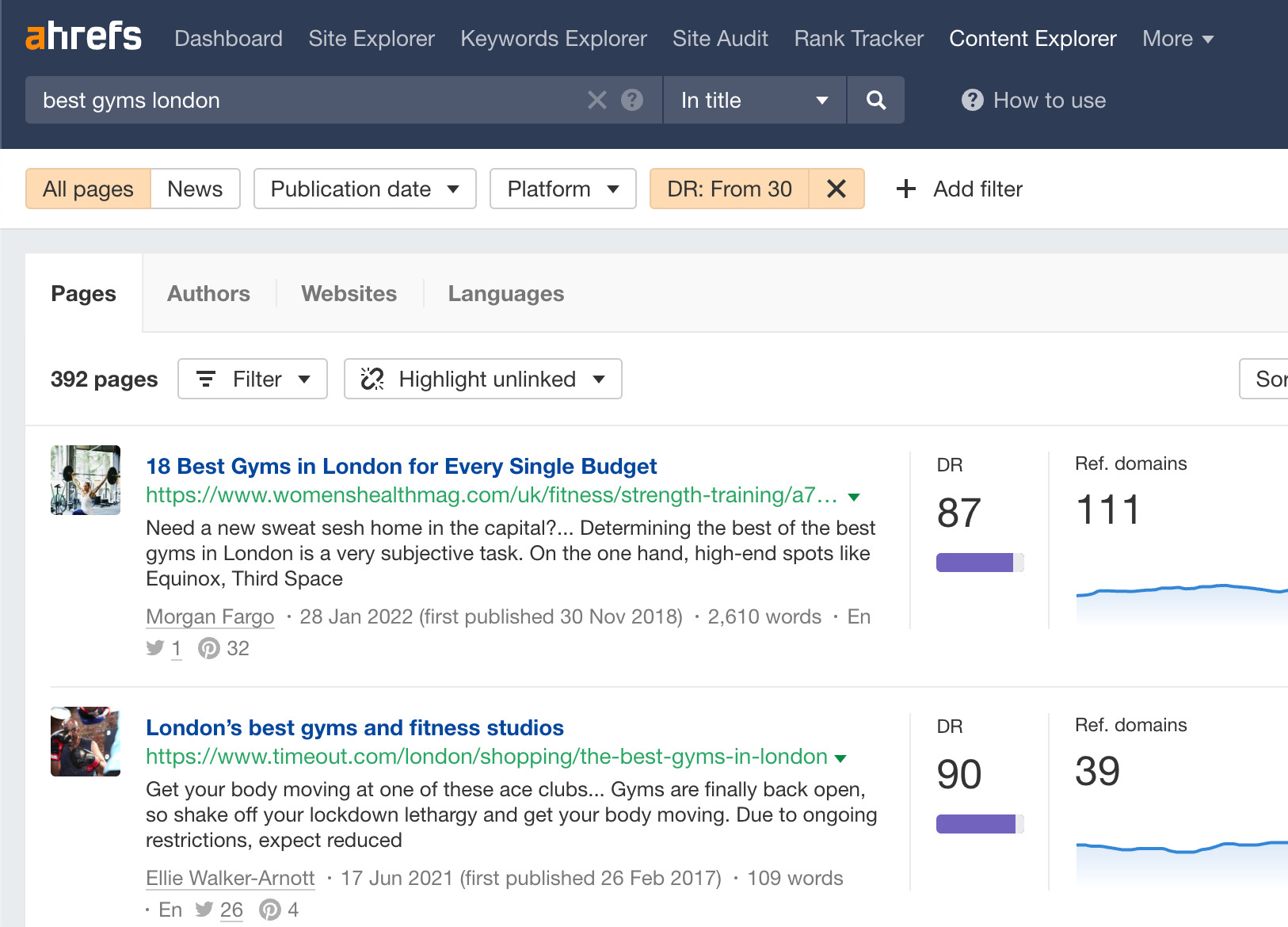
Or if you prefer, plug a competitor into Site Explorer, go to the Backlinks report, and search for referring pages with “best [thing]” in their titles.
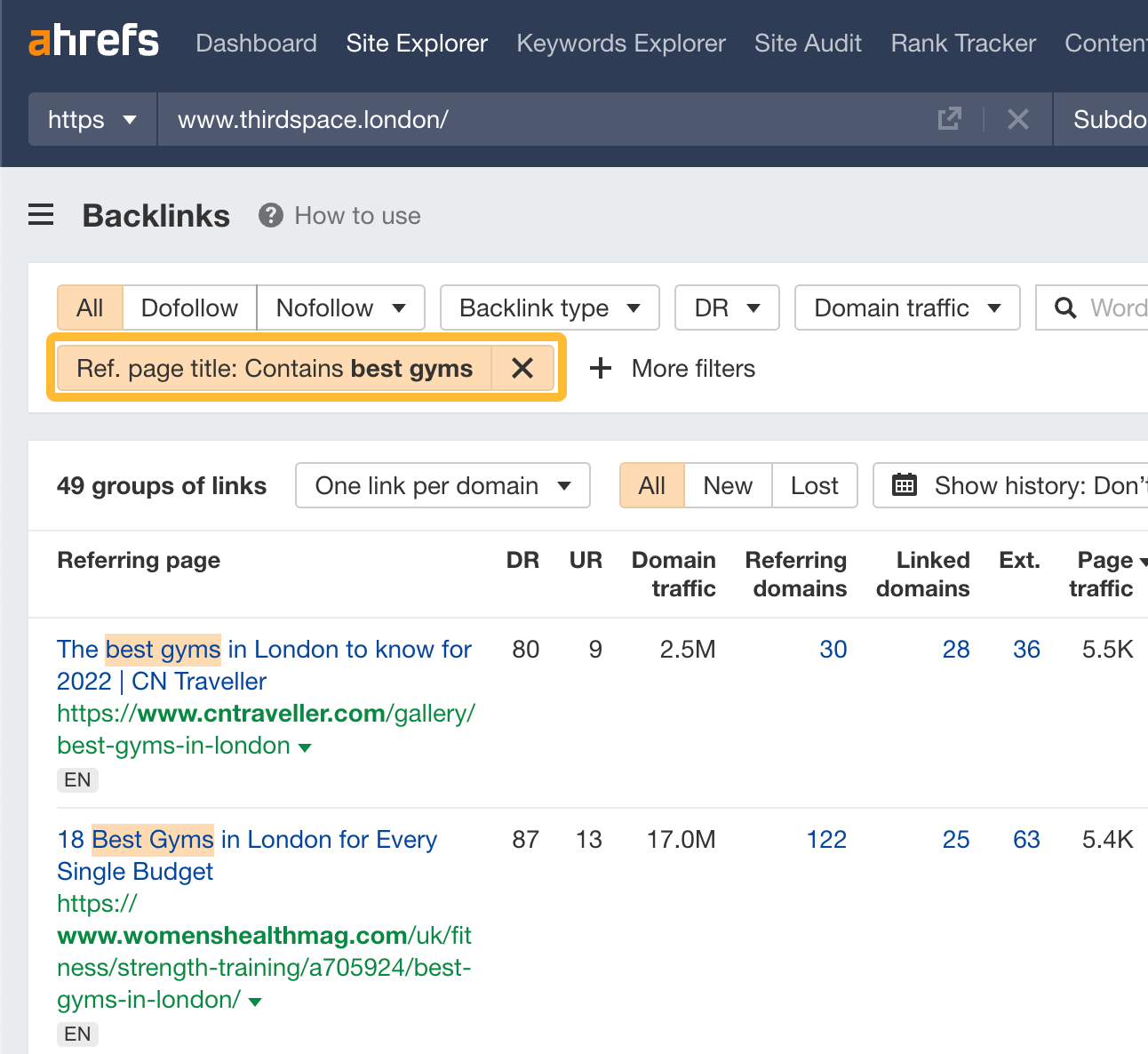
3. Search for pages with resource sections
Not all resource pages are pages dedicated solely to listing resources.
For example, many of our blog posts have “further reading” sections where we list and link to related resources from other websites:

Here are the search operators you can use to find these opportunities:
- Keyword “further reading”
- Keyword “more resources”
- Keyword “other resources”
- Keyword “favorite resources”
- Keyword “favorite tools”
Then it’s just a case of opening each search result, using CTRL/CMD+F to search for the footprint on the page, and checking that they link to external resources in the section (not just internal resources).
If the opportunity looks promising, find the site owner’s email address and pitch your resource.
Here are the pros and cons of pitching these types of pages:
| Pros | Cons |
|---|---|
| Fewer people are doing it (less competitive). | Not as many of these pages around. |
| Links are often higher quality than “traditional” resource pages. | Their creators aren’t looking for suggestions or feedback, which may mean lower conversion rate. |
If you can build a relationship with the site owner or at least help in some way before pitching, you can overcome some of the cons above.
Final thoughts
Resource page link building is about as straightforward as it gets. That’s probably why so many SEO professionals continue to use this tactic—even in a world of skyscrapers and shotguns.
Want a quick recap of everything we covered? Watch this video:
Got questions? Give me a shout on Twitter.
SEO
Google On Hyphens In Domain Names

Google’s John Mueller answered a question on Reddit about why people don’t use hyphens with domains and if there was something to be concerned about that they were missing.
Domain Names With Hyphens For SEO
I’ve been working online for 25 years and I remember when using hyphens in domains was something that affiliates did for SEO when Google was still influenced by keywords in the domain, URL, and basically keywords anywhere on the webpage. It wasn’t something that everyone did, it was mainly something that was popular with some affiliate marketers.
Another reason for choosing domain names with keywords in them was that site visitors tended to convert at a higher rate because the keywords essentially prequalified the site visitor. I know from experience how useful two-keyword domains (and one word domain names) are for conversions, as long as they didn’t have hyphens in them.
A consideration that caused hyphenated domain names to fall out of favor is that they have an untrustworthy appearance and that can work against conversion rates because trustworthiness is an important factor for conversions.
Lastly, hyphenated domain names look tacky. Why go with tacky when a brandable domain is easier for building trust and conversions?
Domain Name Question Asked On Reddit
This is the question asked on Reddit:
“Why don’t people use a lot of domains with hyphens? Is there something concerning about it? I understand when you tell it out loud people make miss hyphen in search.”
And this is Mueller’s response:
“It used to be that domain names with a lot of hyphens were considered (by users? or by SEOs assuming users would? it’s been a while) to be less serious – since they could imply that you weren’t able to get the domain name with fewer hyphens. Nowadays there are a lot of top-level-domains so it’s less of a thing.
My main recommendation is to pick something for the long run (assuming that’s what you’re aiming for), and not to be overly keyword focused (because life is too short to box yourself into a corner – make good things, course-correct over time, don’t let a domain-name limit what you do online). The web is full of awkward, keyword-focused short-lived low-effort takes made for SEO — make something truly awesome that people will ask for by name. If that takes a hyphen in the name – go for it.”
Pick A Domain Name That Can Grow
Mueller is right about picking a domain name that won’t lock your site into one topic. When a site grows in popularity the natural growth path is to expand the range of topics the site coves. But that’s hard to do when the domain is locked into one rigid keyword phrase. That’s one of the downsides of picking a “Best + keyword + reviews” domain, too. Those domains can’t grow bigger and look tacky, too.
That’s why I’ve always recommended brandable domains that are memorable and encourage trust in some way.
Read the post on Reddit:
Read Mueller’s response here.
Featured Image by Shutterstock/Benny Marty
SEO
Reddit Post Ranks On Google In 5 Minutes

Google’s Danny Sullivan disputed the assertions made in a Reddit discussion that Google is showing a preference for Reddit in the search results. But a Redditor’s example proves that it’s possible for a Reddit post to rank in the top ten of the search results within minutes and to actually improve rankings to position #2 a week later.
Discussion About Google Showing Preference To Reddit
A Redditor (gronetwork) complained that Google is sending so many visitors to Reddit that the server is struggling with the load and shared an example that proved that it can only take minutes for a Reddit post to rank in the top ten.
That post was part of a 79 post Reddit thread where many in the r/SEO subreddit were complaining about Google allegedly giving too much preference to Reddit over legit sites.
The person who did the test (gronetwork) wrote:
“…The website is already cracking (server down, double posts, comments not showing) because there are too many visitors.
…It only takes few minutes (you can test it) for a post on Reddit to appear in the top ten results of Google with keywords related to the post’s title… (while I have to wait months for an article on my site to be referenced). Do the math, the whole world is going to spam here. The loop is completed.”
Reddit Post Ranked Within Minutes
Another Redditor asked if they had tested if it takes “a few minutes” to rank in the top ten and gronetwork answered that they had tested it with a post titled, Google SGE Review.
gronetwork posted:
“Yes, I have created for example a post named “Google SGE Review” previously. After less than 5 minutes it was ranked 8th for Google SGE Review (no quotes). Just after Washingtonpost.com, 6 authoritative SEO websites and Google.com’s overview page for SGE (Search Generative Experience). It is ranked third for SGE Review.”
It’s true, not only does that specific post (Google SGE Review) rank in the top 10, the post started out in position 8 and it actually improved ranking, currently listed beneath the number one result for the search query “SGE Review”.
Screenshot Of Reddit Post That Ranked Within Minutes
Anecdotes Versus Anecdotes
Okay, the above is just one anecdote. But it’s a heck of an anecdote because it proves that it’s possible for a Reddit post to rank within minutes and get stuck in the top of the search results over other possibly more authoritative websites.
hankschrader79 shared that Reddit posts outrank Toyota Tacoma forums for a phrase related to mods for that truck.
Google’s Danny Sullivan responded to that post and the entire discussion to dispute that Reddit is not always prioritized over other forums.
Danny wrote:
“Reddit is not always prioritized over other forums. [super vhs to mac adapter] I did this week, it goes Apple Support Community, MacRumors Forum and further down, there’s Reddit. I also did [kumo cloud not working setup 5ghz] recently (it’s a nightmare) and it was the Netgear community, the SmartThings Community, GreenBuildingAdvisor before Reddit. Related to that was [disable 5g airport] which has Apple Support Community above Reddit. [how to open an 8 track tape] — really, it was the YouTube videos that helped me most, but it’s the Tapeheads community that comes before Reddit.
In your example for [toyota tacoma], I don’t even get Reddit in the top results. I get Toyota, Car & Driver, Wikipedia, Toyota again, three YouTube videos from different creators (not Toyota), Edmunds, a Top Stories unit. No Reddit, which doesn’t really support the notion of always wanting to drive traffic just to Reddit.
If I guess at the more specific query you might have done, maybe [overland mods for toyota tacoma], I get a YouTube video first, then Reddit, then Tacoma World at third — not near the bottom. So yes, Reddit is higher for that query — but it’s not first. It’s also not always first. And sometimes, it’s not even showing at all.”
hankschrader79 conceded that they were generalizing when they wrote that Google always prioritized Reddit. But they also insisted that that didn’t diminish what they said is a fact that Google’s “prioritization” forum content has benefitted Reddit more than actual forums.
Why Is The Reddit Post Ranked So High?
It’s possible that Google “tested” that Reddit post in position 8 within minutes and that user interaction signals indicated to Google’s algorithms that users prefer to see that Reddit post. If that’s the case then it’s not a matter of Google showing preference to Reddit post but rather it’s users that are showing the preference and the algorithm is responding to those preferences.
Nevertheless, an argument can be made that user preferences for Reddit can be a manifestation of Familiarity Bias. Familiarity Bias is when people show a preference for things that are familiar to them. If a person is familiar with a brand because of all the advertising they were exposed to then they may show a bias for the brand products over unfamiliar brands.
Users who are familiar with Reddit may choose Reddit because they don’t know the other sites in the search results or because they have a bias that Google ranks spammy and optimized websites and feel safer reading Reddit.
Google may be picking up on those user interaction signals that indicate a preference and satisfaction with the Reddit results but those results may simply be biases and not an indication that Reddit is trustworthy and authoritative.
Is Reddit Benefiting From A Self-Reinforcing Feedback Loop?
It may very well be that Google’s decision to prioritize user generated content may have started a self-reinforcing pattern that draws users in to Reddit through the search results and because the answers seem plausible those users start to prefer Reddit results. When they’re exposed to more Reddit posts their familiarity bias kicks in and they start to show a preference for Reddit. So what could be happening is that the users and Google’s algorithm are creating a self-reinforcing feedback loop.
Is it possible that Google’s decision to show more user generated content has kicked off a cycle where more users are exposed to Reddit which then feeds back into Google’s algorithm which in turn increases Reddit visibility, regardless of lack of expertise and authoritativeness?
Featured Image by Shutterstock/Kues
SEO
WordPress Releases A Performance Plugin For “Near-Instant Load Times”

WordPress released an official plugin that adds support for a cutting edge technology called speculative loading that can help boost site performance and improve the user experience for site visitors.
Speculative Loading
Rendering means constructing the entire webpage so that it instantly displays (rendering). When your browser downloads the HTML, images, and other resources and puts it together into a webpage, that’s rendering. Prerendering is putting that webpage together (rendering it) in the background.
What this plugin does is to enable the browser to prerender the entire webpage that a user might navigate to next. The plugin does that by anticipating which webpage the user might navigate to based on where they are hovering.
Chrome lists a preference for only prerendering when there is an at least 80% probability of a user navigating to another webpage. The official Chrome support page for prerendering explains:
“Pages should only be prerendered when there is a high probability the page will be loaded by the user. This is why the Chrome address bar prerendering options only happen when there is such a high probability (greater than 80% of the time).
There is also a caveat in that same developer page that prerendering may not happen based on user settings, memory usage and other scenarios (more details below about how analytics handles prerendering).
The Speculative Loading API solves a problem that previous solutions could not because in the past they were simply prefetching resources like JavaScript and CSS but not actually prerendering the entire webpage.
The official WordPress announcement explains it like this:
Introducing the Speculation Rules API
The Speculation Rules API is a new web API that solves the above problems. It allows defining rules to dynamically prefetch and/or prerender URLs of certain structure based on user interaction, in JSON syntax—or in other words, speculatively preload those URLs before the navigation. This API can be used, for example, to prerender any links on a page whenever the user hovers over them.”
The official WordPress page about this new functionality describes it:
“The Speculation Rules API is a new web API… It allows defining rules to dynamically prefetch and/or prerender URLs of certain structure based on user interaction, in JSON syntax—or in other words, speculatively preload those URLs before the navigation.
This API can be used, for example, to prerender any links on a page whenever the user hovers over them. Also, with the Speculation Rules API, “prerender” actually means to prerender the entire page, including running JavaScript. This can lead to near-instant load times once the user clicks on the link as the page would have most likely already been loaded in its entirety. However that is only one of the possible configurations.”
The new WordPress plugin adds support for the Speculation Rules API. The Mozilla developer pages, a great resource for HTML technical understanding describes it like this:
“The Speculation Rules API is designed to improve performance for future navigations. It targets document URLs rather than specific resource files, and so makes sense for multi-page applications (MPAs) rather than single-page applications (SPAs).
The Speculation Rules API provides an alternative to the widely-available <link rel=”prefetch”> feature and is designed to supersede the Chrome-only deprecated <link rel=”prerender”> feature. It provides many improvements over these technologies, along with a more expressive, configurable syntax for specifying which documents should be prefetched or prerendered.”
See also: Are Websites Getting Faster? New Data Reveals Mixed Results
Performance Lab Plugin
The new plugin was developed by the official WordPress performance team which occasionally rolls out new plugins for users to test ahead of possible inclusion into the actual WordPress core. So it’s a good opportunity to be first to try out new performance technologies.
The new WordPress plugin is by default set to prerender “WordPress frontend URLs” which are pages, posts, and archive pages. How it works can be fine-tuned under the settings:
Settings > Reading > Speculative Loading
Browser Compatibility
The Speculative API is supported by Chrome 108 however the specific rules used by the new plugin require Chrome 121 or higher. Chrome 121 was released in early 2024.
Browsers that do not support will simply ignore the plugin and will have no effect on the user experience.
Check out the new Speculative Loading WordPress plugin developed by the official core WordPress performance team.
How Analytics Handles Prerendering
A WordPress developer commented with a question asking how Analytics would handle prerendering and someone else answered that it’s up to the Analytics provider to detect a prerender and not count it as a page load or site visit.
Fortunately both Google Analytics and Google Publisher Tags (GPT) both are able to handle prerenders. The Chrome developers support page has a note about how analytics handles prerendering:
“Google Analytics handles prerender by delaying until activation by default as of September 2023, and Google Publisher Tag (GPT) made a similar change to delay triggering advertisements until activation as of November 2023.”
Possible Conflict With Ad Blocker Extensions
There are a couple things to be aware of about this plugin, aside from the fact that it’s an experimental feature that requires Chrome 121 or higher.
A comment by a WordPress plugin developer that this feature may not work with browsers that are using the uBlock Origin ad blocking browser extension.
Download the plugin:
Speculative Loading Plugin by the WordPress Performance Team
Read the announcement at WordPress
Speculative Loading in WordPress
See also: WordPress, Wix & Squarespace Show Best CWV Rate Of Improvement
-

 PPC6 days ago
PPC6 days agoCompetitor Monitoring: 7 ways to keep watch on the competition
-

 SEARCHENGINES6 days ago
SEARCHENGINES6 days agoMore Google March 2024 Core Update Ranking Volatility
-

 PPC6 days ago
PPC6 days ago31 Ready-to-Go Mother’s Day Messages for Social Media, Email, & More
-

 PPC6 days ago
PPC6 days agoA History of Google AdWords and Google Ads: Revolutionizing Digital Advertising & Marketing Since 2000
-

 WORDPRESS7 days ago
WORDPRESS7 days agoThrive Architect vs Divi vs Elementor
-

 WORDPRESS5 days ago
WORDPRESS5 days agoTurkish startup ikas attracts $20M for its e-commerce platform designed for small businesses
-

 MARKETING5 days ago
MARKETING5 days agoRoundel Media Studio: What to Expect From Target’s New Self-Service Platform
-

 SEARCHENGINES5 days ago
SEARCHENGINES5 days agoGoogle Search Results Can Be Harmful & Dangerous In Some Cases















You must be logged in to post a comment Login